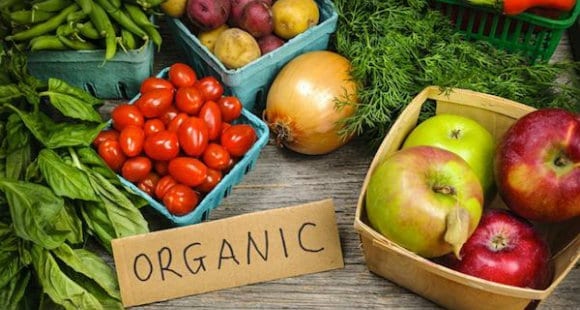Organic Food | Benefits, Importance And Definition

Written by Sarah Curran
Organic Food
Organic food has grown in popularity significantly over the last few years. However, there is often confusion as to what benefits organic produce can provide. Here, we give an insight as to the full effect it can have on ourselves and the environment we live in.

What Does "Organic" Mean?
The official definition of organic from the Department for Agriculture and Rural Affairs is:
Simply put, organic food is produced through natural means.
Are Only Fruit and Vegetables Organic?
It's not just plants that can be produced organically. Organic animals are reared without the mass use of antibiotics and other unnatural methods. Plus, materials like cotton can be grown organically too.
You may have seen our organic range - it covers everything from protein powder to green tea.

Organic Benefit #1: It's Better for the Environment
The way we grow our fruits and vegetables has a big effect on the planet . Currently, it is responsible for around 14% of total green-house gas emissions worldwide. According to the Soil Association, if everyone started to "go organic", we could offset at around 23% of UK agriculture’s current official green-house gas emissions.
Organic agriculture also helps our soil to be more resistant to the impacts of climate change. Organic soil is generally more resistant to both drought and floods. After all, soil isn't a renewable resource, so we should protect what we have.
Not only that, but organic farming avoids the common pesticides that can pollute our environment and water. There's over 320 pesticides regularly used, and many end up showing up on your plate.
Organic Benefit #2: It's Kinder to Animals
Organic farms protect key habitat areas for wildlife. This includes ponds, hedgerows, and grassy banks. In doing this, organic farms support up to 50% more wildlife, which is vital for our ecosystem. For instance, 2 out of 25 UK bumble bee species are already extinct, and these are key pollinators for our wild plants and flowers.

Organic Benefit #3: It's More Nutritious
According to a 10-year study conducted by the University of California, organic tomatoes are much higher in antioxidants, particularly quercetin (79% higher) and kaempferol (97% higher) in organic tomatoes.
There are limited studies on the nutritional benefits of organic foods, but studies like the one above indicate that they are naturally more beneficial to the body.
Organic Benefit #4: Control Over Your Diet
As we all know, fitness and nutrition are intrinsically linked, and as people focus on their diet, they are more commonly wondering where their nutrition is coming from.
By law, for food to be labelled as "organic" it must follow strict rules. This means that you can trace everything that has gone into your organic product - there are no hidden surprises. For instance, when you buy a banana, it doesn't show on the label all the chemicals and pesticides that have gone into farming that fruit. When you buy organic, you don't need to wonder what's beyond the ingredients label.
To become classed as organic, food must be free from genetically modified ingredients, hydrogenated fats, artificial food colours and preservatives. So if you are conscious about maintaining a naturally beneficial diet, eating organic produce is the surest way to achieve it.

Dawid Lyszczek is an expert new product developer, food technologist, nutritionist and personal trainer. He holds a bachelor’s degree in Human Nutrition, master’s degree in Food Innovation and Level 3 Certificate in Personal Training. Dawid specialises in evidence-based body-composition nutrition and training for both amateurs and physique athletes, and has been involved in sports nutrition and weight training for over 15 years. Dawid is also a former competitive bodybuilder, UKBFF British finalist in “Intermediates Over 90kgs” Class of 2013, as featured in Flex magazine.
Dawid’s academic area of interest has involved both the role of meal frequency on body composition, and also functional food development, which you can find out more about here.
In his current role, Dawid bridges the gap between sports nutrition and food technology, bringing in academic experience backed by real life practice that produces results.
You can find out more about Dawid’s experience here.







